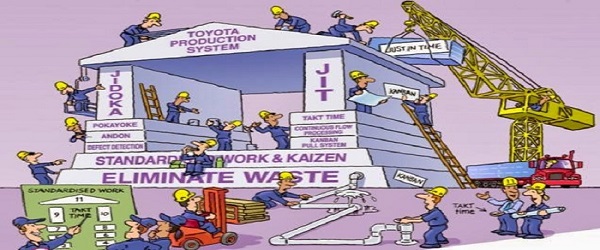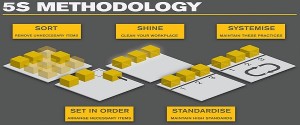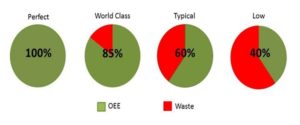
The Toyota Production System is the methodology developed at Toyota that led to the development of lean manufacturing and the lean philosophy.
The Toyota Production System was developed by Sakichi Toyoda, Taiichi Ohno and others at Toyota starting in the late 1940’s. Over the next several decades, Toyota refined and developed the methodology. The focus of the Toyota Production System is the elimination of waste. Toyota identified 7 Wastes to be eliminated, and then developed a wide range of techniques and practices for eliminating these wastes.
The core of the Toyota Production System is its focus on continuous improvement, respect for people and commitment to its long term philosophy, even at the expense of short term financial gain. The focus on the 7 Wastes requires an ongoing effort to eliminate waste. Toyota implemented a number of techniques to create a culture of change. These included soliciting ideas from employees, empowering employees to eliminate waste, and visual metrics to measure performance improvements.
Over time, the benefits of eliminating waste led to substantial improvements at Toyota, including faster lead times, better quality and lower costs. These improvements led to many companies copying the techniques adopted by Toyota. Some companies focused on the lead time and inventory reduction techniques and implemented Just in Time. Others focused on the quality improvements and implemented Total Quality Management, Statistical Process Control, and mistake proofing techniques such as Poke a Yoke.
Eventually, the complete package of tools and techniques comprising the Toyota Production System was recognized and adopted. This generalized methodology was called Lean Manufacturing, and today with the application to non-manufacturing companies, is often called Lean.
The techniques of the Toyota Production System are an extremely powerful set of tools that can be applied to any organization. The greatest challenge in adopting a lean system based on the Toyota Production System is the cultural change that must occur to reap the full benefits of the methodology. The Toyota Production System developed over several decades. Integral to the system is the concept of Kaizen, or continuous improvement. Today, Kaizen is often used to refer to Kaizen events. These are focused, short term activities designed to make improvements. Although Kaizen events can be effective, they cannot replace the Toyota Production System philosophy of continuous improvement.
In addition, the techniques of the Toyota Production System cannot be implemented in isolation. The methodology requires an organization wide, top down commitment and approach. For example, implementing a kanban system is an effective technique within the Toyota Production System, but this technique will not be as effective if processes are not streamlined. Only when setup times are reduced, unnecessary processes eliminated, quality improved and other steps taken, can the Kanban system deliver its full results.





